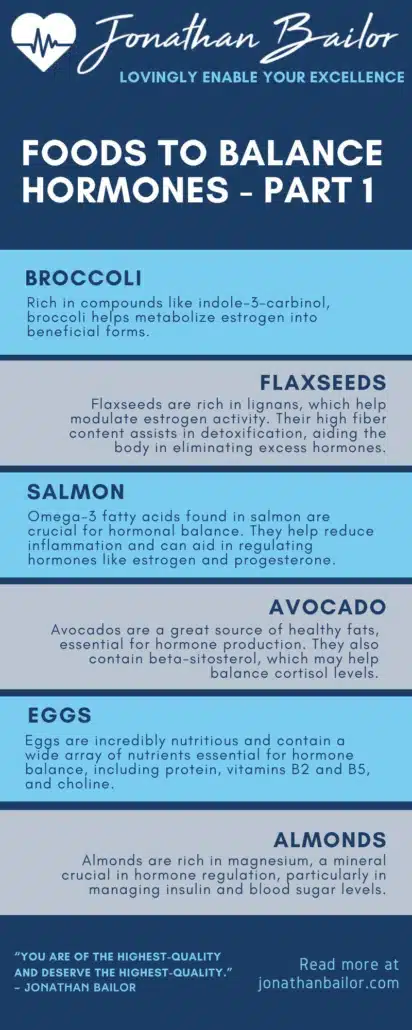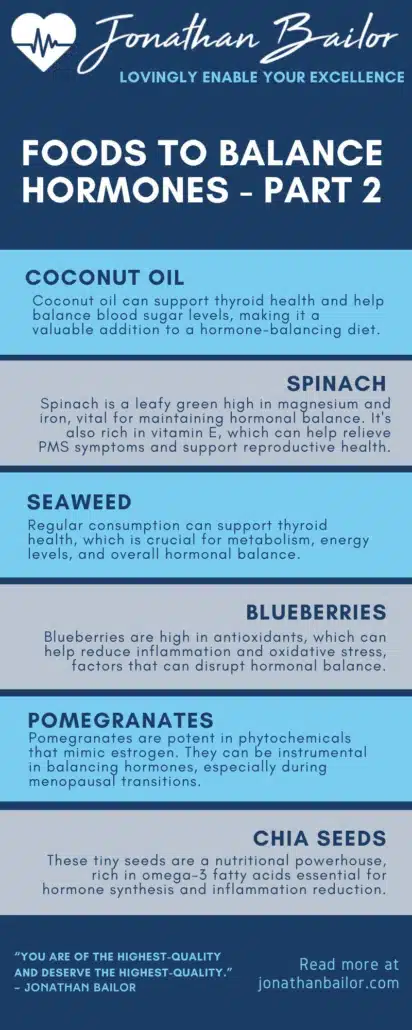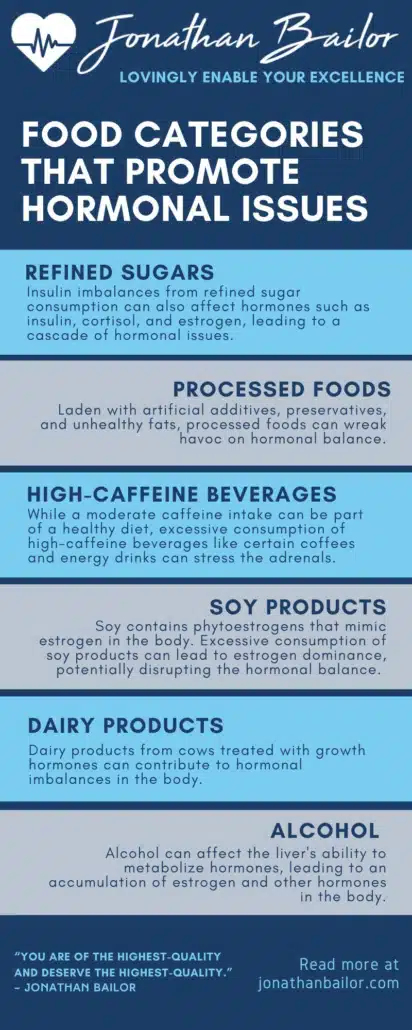12 Best Foods to Balance Hormones + 6 Foods that Disrupt Hormones
Embarking on the path to a healthy hormone balance can sometimes feel intricate and complex, akin to mastering the art of a well-tended garden. Everything is delicately interconnected, and the choices we make in our diet can significantly influence this delicate balance. This hormone health guide with Jonathan Bailor is a curated collection of nature’s finest offerings, each a powerhouse in its own right, meticulously chosen for its ability to harmonize and support hormone balance.
Picture a plate that bursts with a kaleidoscope of colors and textures, each element thoughtfully selected for its role in fine-tuning our internal systems. These foods go beyond mere dietary components; they are a celebration of vitality and health, echoing the profound impact of our nutritional choices on our well-being.
As we delve into the world of hormone-healing foods, it’s essential to honor each individual’s unique journey. Embracing diversity in your dietary choices allows you to understand and cater to your body’s distinct needs and rhythms. This approach isn’t about conforming to a rigid standard but rather about tuning in to what our bodies require and responding with nurturing care so that it can naturally reverse hormone imbalances.
This guide is designed to be a companion on your journey to discovering the transformative power of foods that can bring your hormones into balance. It’s a compilation of knowledge and insights thoughtfully crafted to resonate with anyone seeking to enhance their health through informed dietary choices. Whether you’re sharing these insights with friends or embracing them on a personal level, this guide is here to offer guidance and support.
Remember, this introduction is just the first step. In the following sections, we will explore each hormone-healing food in detail, uncovering its unique characteristics and health benefits to help you make informed dietary choices.
So, let’s begin this enlightening journey together. Embrace the natural wisdom in our foods, and share this treasure trove of information with those around you. Engage in conversations, exchange ideas, and explore these concepts in the comfort of your home. Each step you take is a stride towards a more balanced, energized, and harmonious you.
What Are Hormones?
Hormones are the unsung heroes within our bodies, acting as essential chemical messengers. These small yet mighty molecules are crafted in the endocrine glands, functioning like a network of communication channels. They embark on a journey through our bloodstream, reaching every nook and cranny of our body. Their purpose? To cast a specific influence on our cells, organs, and tissues, orchestrating many vital bodily functions.
Picture your body as a dynamic city, bustling with over 50 different hormones, each performing a critical role in the complex urban landscape of our health. For women, key players in this metropolitan dance are hormones like estrogen and progesterone, gracefully crafted by the ovaries. They move in sync with the city’s rhythm setters, luteinizing hormone (LH) and follicle-stimulating hormone (FSH). This delicate choreography is vital for regulating the menstrual cycle, fostering fertility, and even playing a part in pregnancy. But their influence isn’t confined to reproductive districts; they also shape the avenues of our libido, metabolism, and overall well-being.
When these hormonal city planners lose their sync, the effects can be seen and felt in the streets. Signs like the irregularity of menstrual cycles, the discomfort of hot flashes, or challenges in conception are like traffic jams, signaling disruption in the intricate urban flow of hormones.
Understanding hormones and their intricate interactions within our bodies is crucial for maintaining overall health and well-being. Lifestyle choices such as diet, exercise, sleep, and stress play a significant role in hormonal function. But in this blog post, we will focus on hormone-balancing foods.
Food Groups for Hormonal Balance
Your body is like a complex, well-oiled machine, functioning at its best when it gets the right mix of nutrients. Proteins, carbohydrates, and fats play crucial roles in maintaining your body’s hormonal balance.
Let’s delve into how these vital macronutrients contribute to your overall well-being.
Protein: The Cornerstone of Hormonal Health
Proteins are the cornerstone of your body’s structure and function, much like the foundation of a solid building. They are essential in building and repairing tissues and play a key role in hormonal balance, particularly in regulating hunger hormones like leptin and ghrelin.
These proteins ensure that your body’s metabolic processes run smoothly, akin to a well-coordinated team working behind the scenes to keep everything on track.
Carbohydrates: The Sustainers of Energy
Carbohydrates are the body’s primary energy source, much like the fuel that keeps a machine running. But it’s not just any fuel—it’s the premium, high-quality kind that comes from nutrient-dense sources. Think of complex carbs with plenty of fiber as the steady, reliable energy that keeps your body functioning smoothly.
Fiber, which doesn’t break down into sugar, acts like a stabilizer, helping to keep your stress hormones, like cortisol, in check. It’s the equilibrium needed in a system that’s constantly active.
Fats: The Regulators of Satisfaction
Finally, let’s turn to fats, the essential nutrients that add quality and sustainability to your diet. Including healthy fats is like using high-grade lubricants in a machine—they ensure everything runs without a hitch. These fats are key in managing appetite and are particularly effective in handling insulin, a critical hormone in the body.
Each meal with a balance of good fats is like a perfectly calibrated part of a machine, ensuring everything works harmoniously and leaves you feeling satisfied. Just as a well-maintained machine operates seamlessly, a diet rich in healthy fats helps your body’s hormonal system function smoothly, contributing to an overall sense of well-being.
As you can see, proteins, carbohydrates, and fats have unique and crucial roles in maintaining hormonal balance. Like a team of experts managing a sophisticated system, these nutrients work together to ensure your body operates efficiently, stays energized, and maintains a sense of harmony and satisfaction. By understanding and valuing their contributions, you can nourish hormone health.
12 Foods to Balance Hormones
Embarking on a journey towards hormonal balance can be transformative. As our bodies age and evolve, so does the need to nourish them with certain foods that naturally balance hormones and support hormonal equilibrium. This goes beyond mere dietary choices; it’s about embracing a lifestyle that harmonizes our internal environment.
The following list highlights 12 foods with unique properties that are pivotal in nurturing hormonal balance. They are not just ingredients on a plate; they represent a synergy with our body’s intricate systems.
1. Broccoli
Cruciferous vegetables like broccoli and cauliflower are great for balancing estrogen levels. Rich in compounds like indole-3-carbinol, it aids in metabolizing estrogen into beneficial forms, reducing the risk of hormonal imbalances. Regular consumption of broccoli can also support liver function, which is essential for hormone regulation.
2. Flaxseeds
Flaxseeds are rich in lignans, which help modulate estrogen activity. Their high fiber content assists in detoxification, aiding the body in eliminating excess hormones. Additionally, the omega-3 fatty acids in flaxseeds contribute to reducing inflammation, a key factor in maintaining hormonal health.
3. Salmon
Omega-3 fatty acids found in salmon are crucial for hormonal balance. They help reduce inflammation and can aid in regulating hormones like estrogen and progesterone. Regular consumption of salmon has been linked to improved mood and cognitive function, thanks to its rich omega-3 content, which is vital for brain health.
4. Avocado
Avocados are a great source of healthy fats, essential for hormone production. They contain beta-sitosterol, which may help balance cortisol levels, reducing the impact of stress on the body. Avocados are also packed with fiber, potassium, and magnesium, all beneficial for overall hormonal health.
5. Eggs
Eggs are incredibly nutritious and contain a wide array of nutrients essential for hormone balance, including protein, vitamins B2 and B5, and choline. These nutrients support the adrenal glands and aid in the production of sex hormones. Their versatility in meals makes them an easy addition to a hormone-balancing diet.
6. Almonds
Almonds are rich in magnesium, a mineral crucial in hormone regulation, particularly in managing insulin and blood sugar levels. They are also a good source of protein and healthy fats, which are key for hormonal balance.

Feeling Better Is Priceless, That's Why We Don't Put A Price On It!
“It’s Like A Free and Medically Valid Version of Noom and Weight Watchers Online”
~ Dr. Doctor Matthew Oleshiak, MD
Click the 'LEARN MORE' button below for free lifetime access to the fast fix program developed by Jonathan and top Ivy League Medical Doctors
LEARN MOREP.S. It's not a free trial. It's not part of the program for free. The entire program is free, forever, for real! No credit card needed.
7. Coconut Oil
Medium-chain triglycerides in coconut oil are unique fats that aid in boosting metabolism and providing a quick energy source. Coconut oil can support thyroid health and help balance blood sugar levels, making it a valuable addition to a hormone-balancing diet.
8. Spinach
Spinach is a leafy green high in magnesium and iron, vital for maintaining hormonal balance. It’s also rich in vitamin E, which can help alleviate PMS symptoms and support overall reproductive health.
9. Seaweed
Seaweed is a rich source of iodine, a critical nutrient for thyroid hormone production. Regular consumption can support thyroid health, which is crucial for metabolism, energy levels, and overall hormonal balance.
10. Blueberries
Blueberries are high in antioxidants, which can help reduce inflammation and oxidative stress, factors that can disrupt hormonal balance. They also have a low glycemic index, making them an ideal choice for maintaining healthy blood sugar levels.
11. Pomegranates
Revered as a symbol of health, pomegranates are potent in phytochemicals that mimic estrogen. They can be instrumental in balancing hormones, especially during menopausal transitions. Pomegranates also contribute to heart health and are rich in antioxidants, which protect the body from cellular damage.
12. Chia Seeds
These tiny seeds are a nutritional powerhouse, rich in omega-3 fatty acids essential for hormone synthesis and inflammation reduction. Chia seeds also offer a high fiber content, promoting digestive health, a key component in hormonal regulation. Their ability to absorb water and form a gel-like substance can aid in maintaining a feeling of fullness, supporting weight management, a factor often linked to hormonal balance.
Incorporating these 12 foods into your diet can significantly influence your hormonal health. Each food brings its own unique blend of nutrients, working in concert to create a harmonious hormonal environment. Remember, achieving hormonal balance is not about a single food or quick fix; it’s about consistently choosing foods that nurture and support your body’s needs.

6 Food Categories that Can Lead to Hormonal Imbalances
Navigating the path to a healthy hormonal system requires not just adding beneficial foods to our diet but also being aware of those that can cause a hormone imbalance. Certain food categories, often ingrained in our daily consumption, can subtly or significantly disrupt our hormonal equilibrium. This understanding is crucial, especially for mature women who are more susceptible to hormonal fluctuations.
This list will explore six types of foods known for their potential to cause hormonal imbalances. These foods don’t just impact our diet; they can alter the delicate hormonal dance within our bodies, leading to various health challenges.
1. Refined Sugars
Refined sugars are notorious for causing spikes in insulin, a hormone critical for regulating blood sugar levels. Frequent consumption of foods high in refined sugars can lead to insulin resistance, a precursor to several hormonal disorders, including type 2 diabetes and PCOS (Polycystic Ovary Syndrome).
Insulin imbalances can also disrupt other hormones, such as cortisol and estrogen, leading to a cascade of hormonal issues. Reducing the intake of refined sugars and opting for natural sweeteners can significantly improve hormonal health.
2. Processed Foods
Laden with artificial additives, preservatives, and unhealthy fats, processed foods can wreak havoc on hormonal balance. They often contain trans fats, which have been linked to increased inflammation and insulin resistance. These foods can also contain hidden sugars and salt, contributing further to hormonal imbalances.
Regularly consuming processed foods can also disrupt gut health, essential for proper hormone regulation.
High-Caffeine Beverages
While a moderate caffeine intake can be part of a healthy diet, excessive consumption of high-caffeine beverages like certain coffees and energy drinks can stress the adrenal glands. This can lead to fluctuations in stress hormones, particularly cortisol. Elevated cortisol levels over time can disrupt sleep patterns, increase blood sugar levels, and even lead to weight gain.
For hormonal health, it’s advisable to moderate caffeine intake and consider alternatives like herbal teas or decaffeinated beverages.
Soy Products
Soy contains phytoestrogens, plant-based compounds that mimic estrogen in the body. While they can be beneficial in some contexts, excessive consumption of soy products can lead to estrogen dominance, potentially disrupting the hormonal balance. This is particularly crucial for women in their menopausal years, as their natural estrogen levels are changing.
It’s advisable to consume soy in moderation and opt for fermented soy products, which are typically easier to digest and less likely to affect hormone levels.
Dairy Products
Dairy products, especially those from cows treated with growth hormones, can impact hormonal health. These products may contain high levels of estrogen and other hormones, which can contribute to hormonal imbalances in the body. This is especially pertinent for women in their 40s and 50s who are already experiencing natural hormonal shifts.
Consuming dairy in moderation or choosing organic and hormone-free dairy products can help maintain a healthier hormonal balance.
Alcohol
Regular and excessive consumption of alcohol can have a significant impact on hormonal balance. Alcohol can affect the liver’s ability to metabolize hormones, leading to an accumulation of estrogen and other hormones in the body. This can disrupt the delicate hormonal equilibrium, especially in women already experiencing natural hormonal shifts.
Additionally, alcohol can interfere with the functioning of the adrenal glands and thyroid, further contributing to hormonal imbalances. Limiting alcohol intake or choosing lower-alcohol options can aid in maintaining hormonal harmony.
By being mindful of these six food categories and their impact on hormonal health, you can take proactive steps to nurture your hormonal balance. This involves not only reducing the intake of these potentially disruptive foods but also focusing on a diet rich in whole, unprocessed foods that support hormonal health, such as fruits, vegetables, lean proteins, and healthy fats.

Understanding Hormone Health: Essential FAQs
1. How do dietary choices impact hormone health?
Diet significantly influences hormone balance. Foods high in refined sugars and processed ingredients can disrupt insulin levels, leading to potential hormonal imbalances. Conversely, a diet rich in whole foods like vegetables, fruits, lean proteins, and healthy fats supports balanced hormone levels. Including foods with omega-3 fatty acids, like fatty fish, can be particularly beneficial in maintaining hormonal equilibrium.
2. Can stress affect hormone balance?
Yes, stress plays a critical role in hormonal health. Chronic stress can lead to elevated cortisol levels, the body’s primary stress hormone. This can disrupt other hormonal functions, including reproductive hormones, thyroid hormones, and sleep-regulating hormones like melatonin. Managing stress through techniques like mindfulness, adequate sleep, and regular physical activity is essential for maintaining hormonal balance.
3. What role does sleep play in hormone health?
Quality sleep is vital for hormonal balance. During sleep, the body regulates many hormones, including growth hormone, cortisol, and insulin. Poor sleep can disrupt these processes, leading to imbalances that affect appetite, metabolism, stress response, and even reproductive health. Prioritizing sleep and maintaining a regular sleep schedule is crucial for optimal hormone regulation.
4. How does physical activity influence hormones?
Regular physical activity positively affects hormone health. Exercise helps regulate insulin sensitivity, reduce cortisol levels, and boost endorphins, which are hormones that promote feelings of well-being. Additionally, activities like strength training can enhance the production of growth hormone and testosterone, which are important for muscle health and overall vitality.
5. Are there specific nutrients that support hormone health?
Certain nutrients are particularly beneficial for hormone health. These include omega-3 fatty acids, found in fatty fish, which can help regulate hormone production and reduce inflammation. Vitamins D and B complex, essential for hormone synthesis, are also crucial. Minerals like magnesium and zinc play roles in supporting thyroid function and reproductive health. Incorporating a diverse diet rich in these nutrients can significantly aid in maintaining hormonal balance.
Embracing Hormonal Harmony: A Closing Thought
Navigating the complexities of hormone health can seem daunting, but understanding its key aspects empowers us to make informed decisions. We can support our body’s natural hormonal balance by embracing nutritious diets, managing stress, prioritizing sleep, and engaging in regular physical activity.
Share this enlightening journey with your friends and family. Spread the word on social media platforms and through email. Together, let’s build an informed, healthy, and thriving community, one step at a time, toward optimal hormonal health.
Feeling Better Is Priceless, That's Why We Don't Put A Price On It!
“It’s Like A Free and Medically Valid Version of Noom and Weight Watchers Online”
~ Dr. Doctor Matthew Oleshiak, MD
Click the 'LEARN MORE' button below for free lifetime access to the fast fix program developed by Jonathan and top Ivy League Medical Doctors
LEARN MOREP.S. It's not a free trial. It's not part of the program for free. The entire program is free, forever, for real! No credit card needed.




